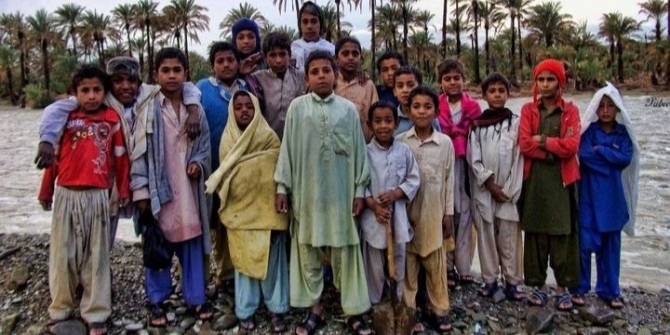 Nearly a month ago, Pakistan launched a religious fatwa against terrorism and use of violence against the government. Pieter-Jan Dockx on why this is a narrow understanding of counter narratives and the only solution to radicalisation and fundamentalism can be found in good governance.
Nearly a month ago, Pakistan launched a religious fatwa against terrorism and use of violence against the government. Pieter-Jan Dockx on why this is a narrow understanding of counter narratives and the only solution to radicalisation and fundamentalism can be found in good governance.
On January 16, Pakistan’s President, Mamnoon Hussain, launched the national counterterrorism narrative, Paigham-e-Pakistan. The announcement sparked wide debate about counter narratives in the country. Simply put, Paigham-e-Pakistan entails a religious fatwa against terrorism and against the use of violence in opposition to the government.
This very narrow understanding of counter narratives is fundamentally flawed. It fails to address issues such as hate speech and the targeting of minorities in the country. The programme does not even come close to the methods that terrorism experts have been advocating for. In summary, these specialists recommend a broad approach that promotes a tolerant and moderate version of Islam, such as the one based on historical figures like Dara or Akbar. These views are then disseminated through education.
Despite the grandeur with which these various theories and schemes have been announced, they all fail to address the fundamentals of counter narratives. No matter what the approach, narrow or broad, one must give the population a reliable government, a viable alternative to extremism. If the idea is to get people to stop picking up arms against the government, they need to be provided incentives. If the approach is the advocacy of a more tolerant Islam, people need a solid reason to place their trust in the institution.
This fundamental base of the counter narrative comes down to something that is broadly defined as ‘good governance’. This is not just about raising people out of absolute poverty or educating them; radicalisation also has a hold over the educated and the privileged. Good governance is about creating responsible, legitimate and credible institutions.

Therein lies the problem with Pakistan. Simply take a look at, let’s say, the past couple of months. The country’s provincial governments have been unable to provide security, just ask Ameen Ansari. Police corruption allowed figures like Rao Anwar to carry out extrajudicial killings, that went conveniently unnoticed. The judiciary, unaware of its boundaries, also regularly interferes in the realm of policy making.
Admittedly, these issues cannot be resolved overnight. Democratic consolidation is a long and painful process. But even then, what becomes more important than finding solutions is addressing the broader self-destructive discourse the political leaders espouse. It is about the effect this malignant language has on general perceptions.
Even when the underlying requirement of counter narratives, good governance, has not been fulfilled, the political leaders could at least try not to undermine their own institutions.
No longer the Prime Minister, Nawaz Sharif has made it his life goal to lay siege to the institution that disposed him. A political strategy in which the justice system features as the external threat will end up sabotaging electoral politics, the judiciary or both. Imran Khan even took it on himself to discredit the very core of democratic politics, an institution he, himself, serves in. That being said, a Chief Minister with 544 votes and a voter turnout of 1.18 per cent also falls under the euphemism of democratic deficit.
Even when the underlying requirement of counter narratives, good governance, has not been fulfilled, the political leaders could at least try not to undermine their own institutions. In Pakistan, these so-called leaders have put electoral success before democracy.
By now, an attentive reader would remark that Western European countries, arguably the standard of good governance, also saw a lot of radicalised youth traveling to Syria and Iraq to join to so-called Islamic State. Their state-led counter narrative initiatives have also not been the exemplification of success. So, does this invalidate the good governance argument then? Not exactly.
Look around
Take for example, my home country, Belgium. Generally speaking the Belgian government is regarded as a well-functioning legitimate institution. However, for migrant communities, especially Muslims, the Belgian government, suffers from those very issues described earlier.
With hardly any representation for the community in the institutions, measures like the ban on unstunned ritual slaughter are easily interpreted as a communal witch hunt. Despite recent improvements in job market discrimination laws, finding a job with a name that sounds remotely Islamic remains next to impossible. Tucked away in slightly dismal council estates in neglected city quarters, how can the government expect a fraction of these youth not to take up weapons against the government? How can they expect their counter narratives to sound somewhat credible?
Extremists around the world are having a field day exploiting their illegitimate opponents. Narrow or broad, all counter narratives stand or fall by the core element of what can loosely be defined as good governance.
This article gives the views of the author, and not the position of the South Asia @ LSE blog, nor of the London School of Economics. Please read our comments policy before posting.
About The Author
 Pieter-Jan Dockx graduated from LSE with an MSc in Conflict Studies. His main research areas include Middle East and South Asian politics. Read more of his blogs at www.pieterjandockx.com.
Pieter-Jan Dockx graduated from LSE with an MSc in Conflict Studies. His main research areas include Middle East and South Asian politics. Read more of his blogs at www.pieterjandockx.com.







